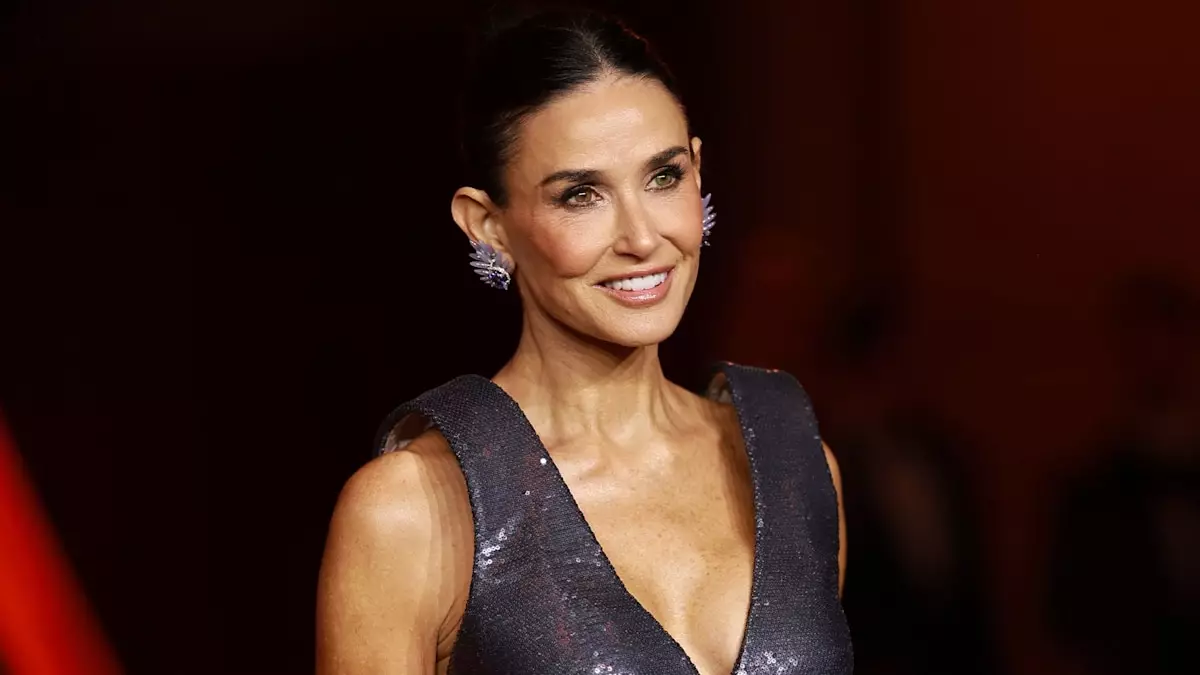Demi Moore has once again managed to captivate the public’s attention—this time not through her celebrity status alone but through her bold transformation for her latest role in the body horror film, “The Substance.” On the eve of Halloween, Moore shared a series of behind-the-scenes photographs from the movie, leaving fans stunned by her drastic appearance. The iconic actress, known for her timeless beauty, looked almost unrecognizable, sporting an array of prosthetics that dramatically altered her face and body, showcasing the struggle of aging in a society obsessed with youth.
In her Instagram posts, Moore presented herself with a completely bald head and a visage marked by aging: deep wrinkles and a heavy layer of makeup that suggested a life full of hardships. The images were powerful and unsettling, evoking both curiosity and consternation among her followers. Such a daring choice reflects a commitment not only to her craft but also to engaging in an honest conversation about aging and self-image in the film industry—topics that resonate strongly with audiences today.
“The Substance” weaves a complex tale of Elisabeth Sparkle, a former television aerobics star whose life takes a dark turn on her 50th birthday. Cast aside from her once-thriving career, she spirals into desperation, prompting her to seek out a black-market drug that promises to restore her lost youth. The drug produces a younger version of her, portrayed by actress Margaret Qualley, creating a jarring dichotomy between the two faces of the same woman. This narrative explores themes of identity, beauty, and the lengths to which individuals may go to reclaim their youthful selves.
The film’s reception has been notable, generating significant box office success and critical acclaim since its premiere in September. Moore’s performance, in particular, has sparked conversations around potential Academy Award recognition, a testament to her ability to dive deep into the complexities of her character. With over $41 million in box office earnings, “The Substance” illustrates that the audience is not only eager for horror but seeks nuanced stories that tackle societal norms head-on.
In various interviews, including one with CBS, Demi Moore has openly discussed her connection to Elisabeth Sparkle, reflecting on her own experiences with aging and beauty standards throughout her career. She candidly revealed the pressure she faced in the entertainment industry, acknowledging moments of personal insecurity that resonated deeply with many women. “I put so much pressure on myself,” she explicates, recalling both humiliation and the internal battles she fought under the often harsh public scrutiny.
Despite the challenges, Moore has cultivated a sense of compassion for her younger self, recognizing her own vulnerability beneath the glamorous facade. “If I could go back, I would give her a hug and say, ‘It’s OK. It’s OK,'” she stated, demonstrating an essential element of self-acceptance. Today, at age 61, Moore oscillates between moments of confidence and self-doubt, a reflection of the human condition that resonates with countless others in similar stages of life.
One of the most profound aspects of Moore’s narrative is her evolving perspective on beauty and aging. Moore candidly acknowledges days of confidence coupled with moments of self-critique. In a heartfelt admission, she acknowledges the inevitability of physical changes: “I don’t like that loose skin. But, you know, it is what it is.” This sentiment captures the essence of embracing reality rather than chasing a fleeting ideal. It highlights the importance of self-acceptance, a vital narrative in today’s society, which often glorifies youthful appearances at the expense of authenticity.
Through her role in “The Substance” and her personal revelations, Demi Moore receives a reverberating message: aging is not something to fear or hide from, but rather a journey that holds value and beauty in its own right. As we navigate the complexities associated with growing older, Moore stands as a testament to the strength found in vulnerability and authenticity. Her evolving relationship with herself may serve as a beacon of hope to others as they confront similar challenges in a culture that often prioritizes youth over wisdom.


Leave a Reply